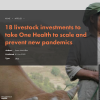
18 livestock investments to take One Health to scale and prevent new pandemics
Core message
The COVID-19 pandemic is only the latest evidence that we can’t protect human health if we fail to protect the health of animals and environments. A new One Health playbook makes the case that livestock systems, economies and peoples of the South are One Health game-changers—inflection points for a healthier future for all.
Readers of health and sustainable development literature will be aware that an approach to better global health known as One Health is having a moment. One Health programs integrate multidisciplinary expertise—particularly medical, veterinary and environmental—to reduce health threats occurring at the intersection of people, animals and their environments. It’s argued that without investing in such a joined up One Health agenda, we’ll continue to fail to address the root causes of our many health crises and be forced to continue to battle them individually, and ineffectively and expensively, after they emerge.
Launched today is a new investment brief from the International Livestock Research Institute (ILRI) offering investors 18 ways to help transform One Health and take it to scale. Each of these recommended actions significantly enhances the diverse livestock systems that are the mainstay of food systems across the developing world.
The rationale for focusing on the small-scale livestock systems of the South is considerable. First, as ILRI Director General Jimmy Smith recently pointed out:
It’s impossible to overstate the importance and ubiquity of livestock in countries across Africa, Asia and Latin America. Everything from food and nutrition to gender equality, livelihoods and trade depend on farm animals. . . . Livestock’s prevalence in developing countries make them a unique vehicle through which to improve the lives of the most vulnerable and, in doing so, also protect health gains the world over.
Second, the world’s food-producing animal populations and systems impact many realms, from agriculture and food systems to food and nutritional security, poverty reduction, public health and environmental protection. Third, several persistent and newly emerging human health threats—particularly those stemming from zoonotic diseases, climate change and environmental degradation—involve animals. And, fourth, investing in ‘multi-solving’ livestock options generates a wealth of benefits that cross many sectors; adopting a more focused ‘livestock lens’ can thus make One Health initiatives more impactful, efficient, equitable and sustainable.
This article originally appeared in ILRI News on 25 July 2022 - read more
